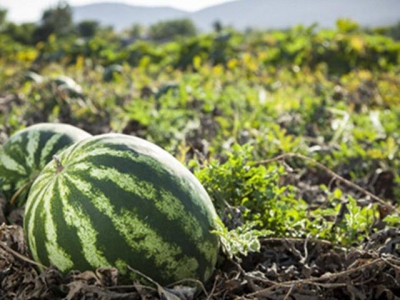Watermelon weeding & watering

Weed control depends on a farmer’s particular situation. For example, where weeds are rife, a weedkiller may be needed.
A healthy crop of good eating quality is the product of sound field practices. Photo: Bill Kerr
It can be applied over the entire land, or row by row. Where drip irrigation is used in low-rainfall areas, row by row treatment may be sufficient. Much of the weeding can be done mechanically, as watermelons are slow off the mark, while weeds are certainly not. This gives you the time to get rid of the weeds effectively before the watermelon runners start spreading rapidly, as all the weed seeds will probably have germinated already.
Tackling weeds mechanically and in good time – before they proliferate – can also prove economical. There’s another good reason to choose mechanical weed control: export restrictions. A buyer who exports watermelon tells me he refuses to accept watermelons where weedkillers have been used as this affects shelf life. If, however, weedkillers are required, consult your local crop chemical representative.
Irrigation
Irrigation can be overhead or by drippers. Drippers save water, but in very dry areas the roots will not be able to forage for nutrients between the rows if this area remains dry. On the other hand, if it rains at an advanced stage of growth and the soil is fertile, the plants might be over-stimulated, resulting in hollow heart, grainy flesh and even bursting. In moister areas, drip irrigation can be an advantage, as it helps to prevent over-moist conditions and resulting disease.
Scheduling irrigation requires great skill and experience. For this reason, I prefer to observe and irrigate according to demand. Initially, the plants will use very little water and irrigation should consequently be on the light side. Apart from the cost, excess irrigation will flush nitrates from the root zone – although you may be able to retrieve these nitrates later on, provided you don’t over-irrigate continually.
It’s important to determine how deep the moisture penetrates after each irrigation. The roots tend to extend about 1m, but can go deeper if the soil type and structure permit, and if the roots are encouraged to go deeper by heavier and less frequent irrigations. Frequent, heavy irrigations will be needed when the leaf growth increases and temperatures rise.
Wind is often a factor during the early part of the season before the rains start. The air is also usually very dry at this time.
Stress
Some growers choose to stress the young plants so that they develop a strong root system. This can be a sound practice as a bigger root system is better at accessing nutrients and moisture. The plant will therefore become more stable and easier to manage – and your chances of having good quality melons are increased. But stressing plants does require some experience to get it just right.
Watermelons are reasonably drought tolerant, but will provide a higher yield when irrigated adequately. Check the depth of moisture penetration by using probes or special instruments placed at various depths and left there for the duration of harvest. You can also observe the condition of the leaves. Any wilting during the heat of the day is a clear indication that you have waited a bit too long before irrigating.
If there is a heat wave, especially if accompanied by a dry wind, the soil will require a higher moisture content to minimise stress. The plant adapts both its cell structure and root volume to prevailing conditions. If there is a sudden change, it will have to play catch-up and thus will benefit from any additional moisture you provide at this time.
Related news
Tools

Phối trộn thức ăn chăn nuôi

Pha dung dịch thủy canh

Định mức cho tôm ăn

Phối trộn phân bón NPK

Xác định tỷ lệ tôm sống

Chuyển đổi đơn vị phân bón

Xác định công suất sục khí

Chuyển đổi đơn vị tôm

Tính diện tích nhà kính

Tính thể tích ao



 Common watermelon fungal diseases
Common watermelon fungal diseases  Planting watermelon seeds and seedlings
Planting watermelon seeds and seedlings